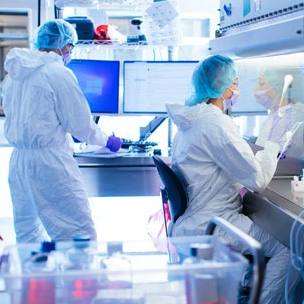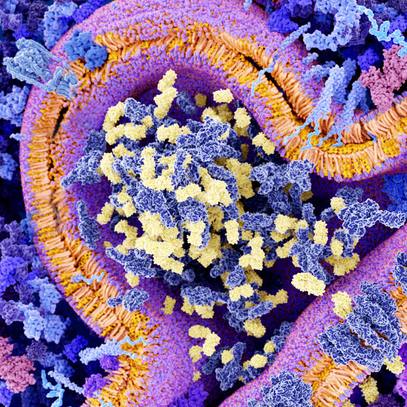-
Research
Nurse scientist research improves patient care
"You have cancer" — it's a statement no one wants to hear. While patients and their families come away with a treatment plan after diagnosis, oftentimes they may need to find their own paths to deal with stress and anxiety.
Cindy Tofthagen, Ph.D., a Mayo Clinic nurse scientist, would like to change that. She's researching potential interventions and seeing positive results.
"We are testing a trauma-based, mind-body intervention to help people address prior traumatic events that may influence how they cope during cancer treatment," she explains. "It's heartwarming to receive reports from patients who note they are better able to cope with treatment and cancer recurrence as a result of our study."
Inspired to give research a try
During her first 15 years as a nurse, Dr. Tofthagen thought clinical research was only for clinical trials of new drugs. When she learned research could be used to positively influence clinical care, it motivated her to take her career in a different direction.
"When I was getting my master's degree, I noticed that those I cared for as a chemotherapy nurse who had a strong spiritual foundation seemed to cope better and be less anxious during their chemotherapy," she says.
That inspired Dr. Tofthagen to conduct a small-scale research project—with 30 people from her practice—to evaluate the relationship between anxiety and spiritual well-being. When she analyzed the data with her faculty adviser, it confirmed her hypothesis.
"That was the first time I had been excited about research," says Dr. Tofthagen. "I realized that nurses could conduct research on a range of important topics such as symptom management, caregiver support, psycho-social well-being and addressing gaps in clinical care that can directly help our patients and their families."
That newfound excitement led her to obtain a Ph.D. degree so she could learn the skills needed to conduct research to further help people with cancer. For the last 15 years, she has led research investigating new ways for both patients and caregivers to cope with a cancer diagnosis and reduce symptoms caused by cancer treatments. She also is passionate about teaching other nurses about research.

An evolving field
Linda Chlan, Ph.D., joined Mayo Clinic in Rochester in 2015 as the organization’s first associate dean for nursing research responsible for Mayo Clinic’s Nursing Research Division. She says much has changed since then.
Ph.D.-level nurses now work on the Mayo campuses in Rochester, Arizona and Florida, successfully publishing their research in high-impact journals and winning extramural grant funding for their programs of research.
The team worked together to publish a paper on the Mayo Clinic Nursing Research Model, which describes their scientific focus areas: symptoms, self-management and caregiving. This model guides the nurse scientists' research, which seeks solutions for the unmet health needs of serious and complex patients.
Nurse scientists are well-positioned to conduct research that can address pressing clinical questions for which there are no answers in the scientific literature. While many health systems may have one Ph.D.-prepared nurse leading evidence-based practice and nurse-initiated research, Mayo Clinic has built an entire team of them. Mayo’s Career Investment Program (CIP) provides support for clinically expert nurses to complete doctoral degrees; recruitment is underway to fill new nurse scientist positions in Arizona and in the Northwest Wisconsin region of the Mayo Clinic Health System.

Other nurse scientist projects
Dr. Tofthagen’s project to improve the care of cancer patients is one of several studies being conducted by nurse scientists at Mayo Clinic.
Sherry Chesak, Ph.D., has a project underway focused on caring for the caregiver. She recently completed a study investigating the outcomes of a stress management and resiliency training program for caregivers of patients with head and neck cancer.
Participants reported significant improvements in self-compassion and anxiety management, with positive trends also noted for resilience, stress management and mindfulness.
"Participants indicated that the program was particularly helpful while facing a stressful life event and that it taught them to stay more in the moment, focus on the positive and support their loved ones during a difficult time," says Dr. Chesak.
Heidi Lindroth, Ph.D., and her team develop digital tools for patients, families and their health care teams to use to monitor brain health and the onset of delirium with support from the National Institute on Aging.
Dr. Lindroth aims to improve monitoring critically ill, older adult patients who may be susceptible to delirium.
“My vision is a world without delirium. All of my work — whether in research or clinical rounds or quality improvement — goes towards moving the needle towards that goal,” says Dr. Lindroth.
Komal Singh, Ph.D., is investigating underlying biological mechanisms for symptom occurrence and severity in association with changes in the gut microbiome after chemotherapy.
Despite current evidence-based interventions, oncology patients experience several neuropsychological symptoms as well as gastrointestinal symptoms because of their treatment. Up to 60% of patients will experience the debilitating symptom of nausea. Her research in symptom science is informed by omics data and aimed at improving outcomes among oncology patients experiencing significant symptoms.
Elizabeth Umberfield, Ph.D., is working to enable clinical research information systems to process permissions granted by patients in consent forms. This work supports her vision for health information to be seamlessly exchanged, consistently represented and understood by both people and information systems.
Samantha Conley, Ph.D., is investigating how behavioral changes can improve symptoms of pain, fatigue and sleep disturbance in people with inflammatory bowel disease in order to reduce their symptom burden and improve their quality of life. She is working with colleagues to develop and test self-management strategies in people with inflammatory bowel disease, who experience ongoing problems with sleep and fatigue.
Approach benefits both patients and nurses
Dr. Lindroth notes that in her nurse scientist role, she can focus 100% on her program of research.
"This is unheard of in other academic or health care settings," she says. "I have seamless access to multiple patient populations and clinical partners with whom I can collaborate and conduct research."
Dr. Singh appreciates that nurse scientists at Mayo Clinic have this unique opportunity to improve patient care.
"We use novel statistical approaches, machine learning, artificial intelligence, informatics technology and omics-based tools to investigate patient risk factors in various settings," she says.
"Nursing is such a dynamic field. Over the centuries, it has risen to meet many diverse and urgent challenges and demands," says Dr. Conley. "Nursing research is the only way that nurses can continue to meet the needs of the profession and the needs of the patient, as it's the foundation for evidence-based practice to improve patient care and outcomes."
Stacy Al-Saleh, Ph.D., says the field provides the foundation for nursing knowledge development, which informs and guides nursing practice.
"It's exciting getting to work with other nurse scientists who are driven by a desire to improve the health and well-being of complex patients," she says.
Dr. Umberfield appreciates that she gets to work at the cutting edge of the health sciences while remaining grounded with a patient-centered focus.
"We have a lot of opportunity to collaborate with scientists and clinicians from other fields, and I believe we bring great value to those collaborations," she adds.















